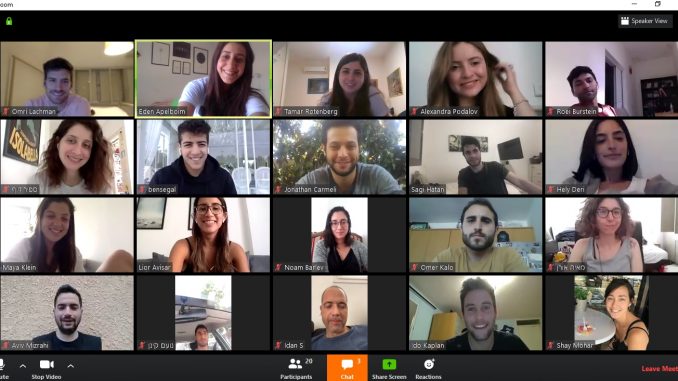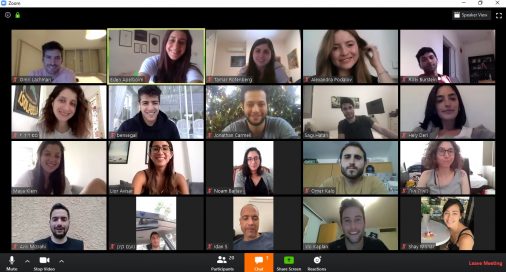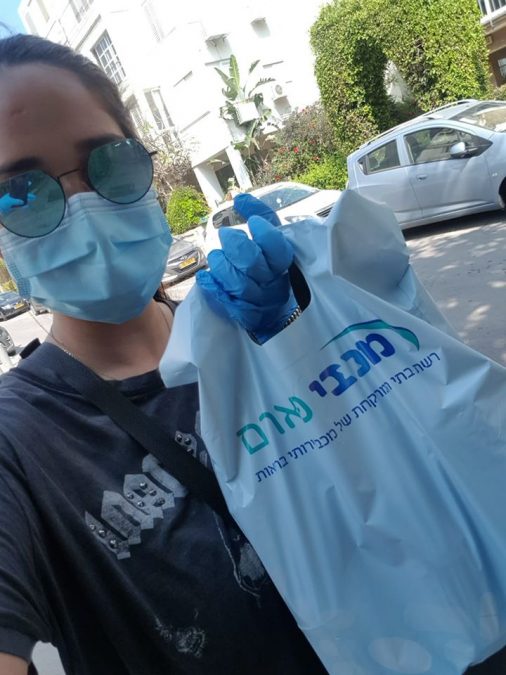

Everything was set. Two close friends (who are also my classmates) and I were about to sign a contract for the perfect apartment and were to enter it in about two weeks’ time. Each of them had found an interesting internship and I, after lots of thought and interviews, had gotten my dream internship in product management at a successful start-up in the center of Berlin.
As mid-March was approaching, it was becoming clearer and clearer that this exciting new chapter I was looking forward to embarking on , would not play out as planned. Understandably, the two classmates flew back to their respective home countries, my internship contract was cancelled until further notice and, thanks to a considerate landlord, our apartment contract was delayed.
Attempting to re-calculate my steps, I too returned to home to Israel, intending to join the rest of the family at my parents’ home in Tel-Aviv. Returning was of course only possible after a 14-day quarantine at another apartment. During this time, I had time to think and process some of the things I had learnt during the first module of the Master’s in Management (MIM) program at ESMT Berlin.
ESMT, as an academic institute and a community, teaches you how to assess situations, understand how the overall value for all parties involved can be maximized, and how to execute that vision. The Covid-19 outbreak caught everyone off-guard and while some businesses were faced with an uncertain future, elderly and other at-risk groups were faced with a dangerous present. Realizing this, I looked for an opportunity to implement my new knowledge and skills to help these people.
While searching for this opportunity, I came across Door to Dor (door to generation) a 1-week old organization set up by 4 local MBA students, one of whom is an acquaintance of mine. The organization’s objectives, among others, include making sure that at-risk groups can stay safe in a respectable manner.

People who want to help the at-risk groups can offer to volunteer and provide those in need of help by delivering groceries and medicine etc. and those in need can request help by providing the company with their information via an online form. The form is sent to a virtual hub where several team leaders disperse the forms between coordinators using an advanced algorithm to locate the closest end-volunteer in the database and contact them regarding the delivery. However, not all help-seekers knew how to fill in the online form. I was given the task of leading the team receiving the calls and filling in the forms for the less technologically able help-seekers.
After being appointed to the task, I decided to look at it in the same manner we were taught in the recent Supply Chain and Operations Management course at ESMT: understand the flow, identify the bottle neck, and optimize the process. At the time, the team had no clear shift schedule, and was working on two platforms at the same time – one was a phone on the computer and the other was a CRM platform used to document the call, all this while of course filling in the form for the help-seeker. The team wasn’t getting to all the calls, with were multiple missed calls and voice messages at the end of the day, and many forms were inaccurately completed.
My manager, head of operations and one of the original 4 organization members, and I decided to recruit new coordinators and ask the existing ones how committed they were. With a clear overview of our “resources”, we set up a clear schedule and the next step was to optimize the process. I asked myself, are all the processes crucial? Can the “product” be “delivered” in less steps? Seeing this, I removed the documenting platform from the process as we were gaining no advantage by documenting the calls.
Looking back at classes from the Organizational Behavior course in the MIM program, I knew that an engaged and enthusiastic team is one that brings results. While it is difficult to create a team identity in several days of remote work, a handful of options were still available. I encouraged the two coordinators that were on the same shift (at that time the shifts all included two coordinators working from home) and initiated group talks via Zoom and made it a point to keep the team as up to date on developments in the organization as I was.
Fast forward two weeks. The team, now including 16 members, has closed the last week with no missed calls or voice messages, everyone knows exactly when their next shift is and a certain buzz is felt, we all feel we are making a difference. Door 2 Dor management forecasts a surge in requests as the lockdown continues and further optimization is needed. Thinking about insights that can be gained from data and opinions of the team itself, I relied on knowledge gained in Econometrics, although I barely passed the course – the knowledge apparently stuck.
I prepared an anonymous survey to be filled in at the end of every shift – how busy was the shift on a scale of 1 to 5? How many calls, roughly, did you take? And the most important one at the end of survey – How can we improve? The feedback provided us with answers to many questions we had such as which shifts of the week can be manned with only one coordinator? Which required three? Do we need more people? Before long, when explaining to my family what I was doing – I realized I was getting great lessons in management while helping those in need, and that was a feeling hard to put in words.
These are difficult times for all of us, but for some more than others. While a lot remains uncertain regarding life in 2020, one thing remains clear – if we all contribute our knowledge to the collective effort, things will be easier. No doubt the easier choice now is to focus on whatever it is you are supposed to be doing – work, university or just trying to get through the longs days indoors. However, I believe one should try and use the crisis as an opportunity to assess a new challenge and contribute to its solution with their knowledge and experience, while learning valuable lessons themselves. In the words of famous British survivor show host Edward Michael “Bear” Grylls – “Improvise, adapt, overcome”.
For those of us looking to lead teams, companies and eventually industries navigating this crisis provides a substantial test. Reality is posing several tricky questions; how do you deal with uncertainty? With the suffering of others? With an extreme change of plans? In my opinion the answer should be “by giving it my best”. So, if you’re a graphic designer – help your local authorities design content that conveys the message of staying safe. If you’re a lawyer, help those who have just lost their jobs to claim their lawful state-funded relief. If you’re an actor, upload entertaining content that will help lift the spirits in these gloomy days. We all have a part. Play yours and help lead the path to global recovery.
Door to Dor has set up an international team to connect with and help similar organizations abroad. You can get in contact with the team via email: D2D.global@gmail.com.
